- Home
- Patrick Ness
The Stone House Page 3
The Stone House Read online
Page 3
April looks disappointed.
‘What about that old woman?’ Ram says. ‘Did she die there?’
‘She did, in . . .’ Tanya checks the screenshot of the death certificate. ‘July last year. The developer bought it from her estate. Her name was Alice Parsons. She lived there for—’
‘Did you say Alice?’ Ram asks, moving closer to the screen.
‘Yes, why?’ she asks.
‘I’ll tell you in a minute. Carry on.’
‘So she was there for years. She inherited it from her parents when they died, moved in, and hardly ever went out. Everything was delivered to the door and left there. At some point overnight, the milk, bread, whatever, would be taken in and the rubbish put outside.’
‘How do you know that?’
‘I phoned some of her neighbours and said I was from the Mass Observation Archive at the local library. I had to sit through their stories as well.’
‘And you’ve done all that since you got back?’ April asks.
‘Oh, I’ve done far more than that,’ she says.
‘Ram’s found something, haven’t you?’ April nudges him.
‘Alright,’ he says, his eyes off the camera as he types. ‘I’m getting to it. I’m sending you some links.’ The links ping up. ‘Go to the top one.’
Tanya clicks through to a site with a black background and grey text. ‘It’s pretty unreadable,’ she says.
‘I’m not sure they’re trying to be inclusive,’ Ram replies.
Tanya scans down the page. It’s an urban legend site. People upload what they’ve heard from their best friend’s third favourite hamster and then people add to it. The one Ram found is called ‘Faceless Alice’. Now his excited face makes sense.
FACELESS ALICE,
SHOREDITCH, UK
I know you won’t believe me but I swear this is true. Everything I’m about to tell was told to me by a close friend and I’d trust him with my life. In fact, he would go on to save my life, but that’s a story for another time.
My friend Andy, about 21 at the time, was doing a teacher training placement at a school in Shoreditch. He was walking home one day when he looked up at this old stone house—complete mess it was, he said—and saw a girl in the top left window. He said she was banging at the window but he couldn’t hear anything. He couldn’t see her face but thought she must be too far away. The next day he went back with a friend. They broke into the house and looked around. There were weird markings on the floor, he said, and they were about to leave when they saw her. She sort of floated down the stairs. Andy thought she must have been 13, 14, but couldn’t be sure because she didn’t have any eyes, mouth, nose, ears, forehead. Her face was a blank oval, completely smooth, as if her features had been wiped away.
She reached out to them, a strange strangled noise coming from her throat. Andy was nearest the door and started to run and thought his friend was just behind. When Andy looked back, the girl with no face was sifting through a pile of dust and his friend was nowhere to be seen. It was only when he looked down that he saw his friend’s glasses and cuff links in the dust.
There were links to similar stories about the house, the faceless girl’s malevolence growing each time. The more recent the story, the more it had grown. The last one was the most chilling.
FACELESS ALICE,
SHOREDITCH, UK
I don’t want to say much. I suppose I feel sorry for her, all alone in that house. That house contains evil that I’ve only seen in dreams. Faceless Alice is not the worst of it. She heralds something far worse. I know this isn’t the place to say this, but if you get out, you’d think you’d be one of the lucky ones. But you’re not. The loneliness doesn’t go away afterwards. The house infects you. This site is for people who love this kind of thing but it should be a warning to the curious, only come if you can handle your own nightmares. They’re waiting for you.
There’s a grainy picture at the bottom. The photo was maybe thirty, forty years old, the house in a much better state, but it was instantly recognisable as the stone house.
‘I’ve zoomed in,’ Ram says, leaning forward. ‘The same girl is at the top front window.’
‘It can’t be the same girl,’ Tanya says.
Another message pings in. Tanya clicks on the image. He’s sent the blown-up image. It’s really poor quality, but then photos were at that time. If you didn’t know better, you’d think everyone in the seventies had sideburns, sprinklers, and smudges for faces.
‘All I can see,’ she says, ‘is that there’s a person in a dress standing close to the window. You can’t tell if it’s the same girl.’
‘That’s because it’s Faceless Alice! She hasn’t got a face, it’s kind of her brand,’ Ram says, coming near to the screen. ‘She haunts the house, appears to her chosen victims, and turns them to dust.’
‘I think someone’s getting carried away,’ Tanya says in a singsong voice. ‘We saw her screaming, remember? Hard to scream without a face.’
Ram’s forehead furrows. ‘Don’t remember that part. Do you really think it’s a coincidence that a girl appears at the same window of the same house?’
‘I don’t know what it is yet. You seem to want her to be a ghost or something.’
‘What else could she be? The same story coming up and we saw the same thing this afternoon. And the owner was called Alice! It all fits. Look I’m trying to help here. What more do you want from me?’
‘She appreciates it, don’t you, Tanya?’ April says.
‘Of course I do,’ Tanya replies. ‘It’s great you’re taking an interest.’ She manages to stop herself saying ‘for once’ out loud. ‘So how do you think Alice Parsons could appear at the window, looking the same for forty years?’
‘Don’t know,’ says Ram. ‘That’s the mystery, isn’t it?’
‘Tanya Adeola, would you get down here now,’ Vivian shouts up the stairs.
‘Time to go,’ Ram says.
Tanya nods. April waves goodbye then disappears.
‘Now, young lady,’ Vivian says. She’s got the ‘young lady’ out. Must be serious.
Tanya closes her laptop and swings her legs off the bed. She walks around the piles of clothes and opens the door.
‘What is it?’ she says, peering down into the hall.
Vivian presses her forefinger between her eyebrows. One of her migraines must be circling. ‘I’ve been calling you down for dinner for the last ten minutes.’
‘Sorry, Mum, didn’t hear you.’ Her mum raises an eyebrow. ‘Really, I didn’t.’
‘What are you doing up there that’s so distracting?’ Vivian folds her arms.
‘Research,’ Tanya says.
‘For your homework?’
‘I’m working on it at home, yes.’
Vivian sighs. ‘Dinner’s ready. That’s all I’ve been trying to say.’ She closes her eyes. ‘It’s on the table. Going cold. It’s already late due to you running about the place.’
Tanya feels the familiar mix of anger and sympathy towards her mum. They’re like competing ivy. She goes through to the kitchen and sits down. The strands of ivy writhe. It always happens. It’s why silence is so brilliant.
‘So,’ Vivian says, spooning out lasagna. ‘What are you working on?’
Silence obviously isn’t an option. Fantastic. ‘We’re looking at local history,’ Tanya says. ‘Houses in particular.’ Thinking on her feet—or rather, on the kitchen chair—is an established art in the Adeola household. ‘I wondered if you could help.’
Vivian softened. ‘What are you looking at?’
‘Do you know an old house, the only one of a row of big detached places that wasn’t sold off for developments? It used to belong to an old woman called Alice Parsons.’
‘I’d forgotten about the Parsons’ house,’ Vivian says. She shivers lightly.
Tanya takes a bite of lasagna with salad. She hadn’t realised how hungry she was.
‘You’re not to go there,’ Vivian s
ays, her face hardening again. ‘Absolutely not. I’m going to see your teacher tomorrow and ask what she’s doing getting you to look into terrible places like that.’ Her hand clamps against her forehead.
‘It was nothing to do with Miss Quill. I chose it. It’s my fault.’
Vivian humphs. ‘Now I can believe that,’ she says.
‘Why shouldn’t I go there?’ Tanya asks.
‘Take my word for it,’ Vivian says. ‘No good can come from an old stone house.’
TEN
GREASY SPOON
‘Two things make this planet passable,’ Miss Quill says, reaching across for a mug as the café owner brings their order to the table. ‘Coffee is one of them.’
‘What’s the other one?’ Tanya asks.
‘If you don’t know then I feel more sorry for you than I do normally. Besides, some things should be kept secret.’ She takes a huge slurp of coffee. A smile threatens her lips then skulks away.
‘Thanks for meeting us, Miss Quill,’ Tanya says.
Miss Quill looks at her breakfast. ‘A “greasy spoon” you call it? Why stop at that utensil? It could be a greasy knife, cup, or kitchen clock, pick anything you see, it’s greasy—if you can see it beneath the layers of spattered fat.’ She looks over at the owner behind the counter. ‘Another sausage. Thank you.’ She slices into her egg with the precision and enthusiasm of someone used to wielding knives.
‘We’d like your help,’ Tanya says. ‘Well, I would. Ram and April are here because I bribed them with waffles.’
Ram raises a fork filled with waffle, bacon, and maple syrup. ‘And I’ll be out of here as soon as I’ve finished this.’
‘You’d better hurry up, then, Miss Adeola,’ Miss Quill says. She lifts phlegmy goop off the top of an egg and wrinkles her nose.
Tanya tells Miss Quill about what happened at the stone house and the research they’d done. Behind them, more sausage spits in the pan. ‘The others didn’t believe me. I’m still not sure that they do.’
‘It’s not that we don’t believe you,’ April says.
‘It’s just that we don’t care,’ Ram says.
‘You were there,’ Tanya says, turning on Ram. ‘You saw it.’
Ram shrugs and eats more waffle.
‘So what do you think, Miss Quill?’ Tanya asks.
Miss Quill picks the bacon rind up from the plate and sucks on it. ‘I think it’s none of your business. And it’s certainly none of mine. Don’t you think we’re dealing with enough shadows as it is, without adding ones that aren’t a threat to us?’ She places her knife and fork in a cross formation.
‘That’s not how they do things here, Miss Quill,’ April says.
‘Yeah,’ says Ram. ‘You don’t need to ward off the plate vampires.’
‘Do you think I don’t know that?’ Miss Quill says. She quickly changes the knife and fork to the usual standing shoulder-to-shoulder, feet-at-the-bottom-of-the-plate position. Tanya gets the briefest of glances into a world where crossed cutlery is standard.
‘Can you help, though, Miss Quill?’ Tanya says.
‘Absolutely not. And you should concentrate on your work,’ Miss Quill says. ‘Ghost stories are best when it’s cold outside. It is far from cold outside. You would be better off looking into whether the Rift is causing an uplift in temperatures.’
‘If we wait for things to attack us, we’re always on the defensive,’ Tanya says. ‘If something odd is going on near the Rift, don’t you think it’s our duty to investigate it?’
‘Duty?’ Miss Quill says, taking a piece of toast from the pile and buttering it in angry strokes. ‘I have enough duty looking after Charlie.’
‘If we only look after ourselves, if we only respond when we are under attack, and not when someone else is, then we can’t really expect anyone to help us,’ April says.
Miss Quill’s teeth crunch into the toast. She chews slowly, looking at Tanya through narrowed eyes.
‘If Tanya’s wrong, then we can all laugh at her,’ Ram says.
Tanya glares at him.
‘That’s the best argument I’ve heard all day,’ Miss Quill says.
‘So you’ll help?’
‘Only if you agree to stop if I say there’s nothing further to look at.’ She points at Tanya. ‘Which I am anticipating will be the case.’
‘Agreed. So,’ Tanya says, leaning forward. She gets bean juice on her sleeve. ‘Are we talking ghosts? Poltergeists? Aliens?’
‘Well,’ Miss Quill says with a sigh. ‘I suppose we’d better find out, hadn’t we?’
ELEVEN
THE CROSSING
We got out over the mountains. It wasn’t far over the border, but we had to keep stopping to hide from planes. Yana was so tired that Ummi and me took turns carrying her until our backs and legs couldn’t take it. On the other side, in Kahramanmara, we were taken to our first camp. Ummi had her ID and some money, but we had to leave everything else. She cried when we were given a small tent for just the three of us, and the day’s rations.
Between the street of shops and the temporary school, the radio playing my favourite songs, enough water to wash for prayer, and the family in the tent next door who gave us blankets and a small table, it would be the most welcoming and equipped of the camps we stayed in, but it was still a town of three thousand tents during the end of winter. The nights were bad. It was when people cried the most. Ummi told us to always stay together and look out for each other. She gave us some of her rations and joked that her limbs were becoming like those of an olive tree. She stayed up at nights, watching. We didn’t know why, then.
One night, Ummi suggested that we should stay there, wait until we heard if Baba was safe and had reached London. But Yana and I said no. We wanted Baba. And so Ummi paid almost all of our money to someone who said he could get us from Turkey to Greece. He promised that it would be safe. I no longer trust promises.
He put us on a plastic dinghy with 120 other people. The sea spat salt at us, drying up our faces and hands. The dinghy tipped backwards and forwards. Yana clung to my leg and looked at me with huge eyes.
I held on to one of the handles, guarding it from anyone else who wanted it. Ummi kept saying that it would be good, that we would see Baba soon. I don’t know whether we hit a big wave, or if something went wrong with the steering, but the dinghy tipped. Our side dipped towards the sea. I held on with both hands. The water surged in, taking my plastic bag with my new phone inside. I could hear Ummi shouting for us to ‘hold on’. Seeing Yana headed for the water, I swept her up and circled her with my arms, gripping the handle and pushing back so that I didn’t crush her. People were screaming, falling into the sea. I was kicked in the face, my headscarf pulled by someone in the water, but I didn’t try to help them. That’s what I remember most. Thinking I couldn’t help. No, not couldn’t. Wouldn’t.
It seemed hours but was probably minutes. The dinghy stabilised and I was still holding on. Yana’s head rested on the side of the dinghy. I picked her up and she murmured, eyes closed. I looked round. Ummi wasn’t there. I called out for her, but I couldn’t hear my voice among the many.
TWELVE
STRANGER ON THE INSIDE
It’s dusk by the time Tanya arrives at the house. She’s the first one here. Maybe none of them is going to turn up, maybe they all only reluctantly agreed so they could think of her standing alone here and laugh. She slips on her big jumper and leans against the railings. She’ll give them ten minutes, then leave.
Quick footsteps approach behind her. Tanya turns and sees April hurrying towards her. ‘I passed Matteusz and Charlie on the way,’ April says. And there they are, walking slowly towards the house.
Miss Quill turns up next, followed five minutes later by Ram. They stand in its shadow, looking up. The London gulls are silent and no one’s talking. It’s weird.
Normally someone is saying too much, usually her, but not even Miss Quill has any terse words. She’s looking up at the house with her head
to one side. It’s like the house infects everything around it. The streaks of grey clouds against purple make it look as if the sky is peeling back to stone.
‘This is a bad idea,’ Ram says. ‘We shouldn’t go in there.’ April links her hand with his. ‘At least not for very long.’
‘Let’s not stand around staring, someone will send for the police,’ Miss Quill says, walking through the gate and kicking back weeds as if she owned the place.
‘Did you hear back from the police?’ Charlie asks. He’s stroking Matteusz’s back as he walks behind him but it’s not clear who he’s reassuring most, himself or Matteusz. Both, probably. Ram and April stand close together. Tanya pulls her jumper round tighter. Everyone’s got someone. Apart from Miss Quill, and who knows if she lost someone or left someone behind?
‘They said they broke in—look, you can see,’ Tanya says, pointing to the door where it has been forced off its hinges, wood splintering where it looks as if a heavy weight has been heaved at the lock. ‘The officer said he couldn’t see any sign of someone being detained, only of rough sleeping. It was empty, though.’
Miss Quill makes a noise somewhere between a humph and a snort. ‘As if they’d be able to see if anything was going on.’ She looks round the garden, tutting. ‘You can’t move for dandelions. Horrible things. Not as bad as buttercups, though. Never let someone put one under your chin to see if you like butter.’
‘Why?’ Ram asks. ‘Are they really doing something else? Are buttercups really alien spy devices, gathering information for an invasion?’
‘No,’ Miss Quill replies, peering in upturned plant pots. ‘Asking about butter is courting disguised as coy nonsense. If they can’t ask you a direct question then they’re not worth talking to.’
‘The officer did seem a bit freaked out on the phone,’ Tanya says.
‘Maybe he doesn’t like phones,’ Charlie says. ‘I don’t.’
‘You didn’t have a problem using yours earlier today,’ Matteusz says, grinning. He waves his phone at Charlie.

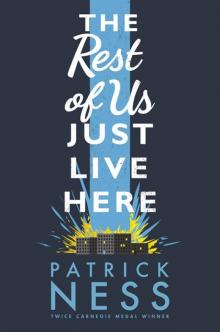 The Rest of Us Just Live Here
The Rest of Us Just Live Here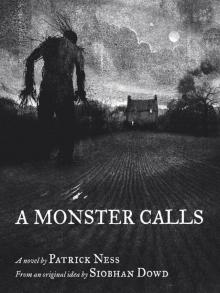 A Monster Calls
A Monster Calls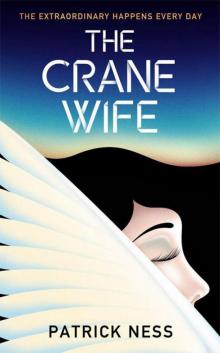 The Crane Wife
The Crane Wife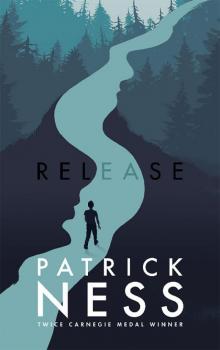 Release
Release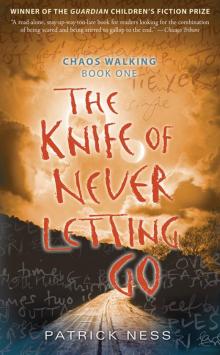 The Knife of Never Letting Go
The Knife of Never Letting Go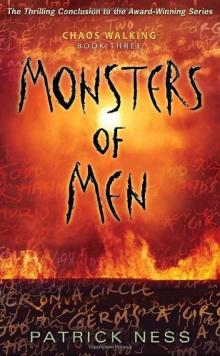 Monsters of Men
Monsters of Men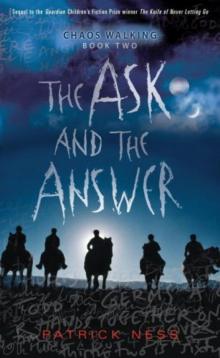 The Ask and the Answer
The Ask and the Answer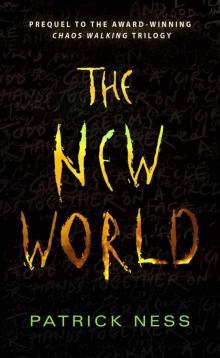 The New World
The New World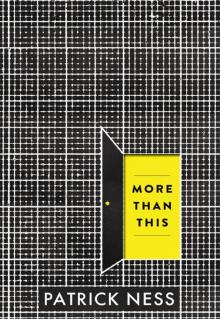 More Than This
More Than This Burn
Burn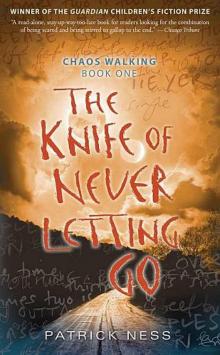 The Knife of Never Letting Go cw-1
The Knife of Never Letting Go cw-1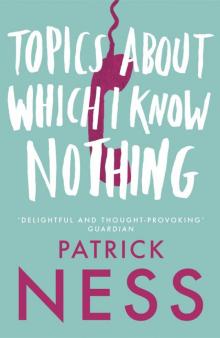 Topics About Which I Know Nothing
Topics About Which I Know Nothing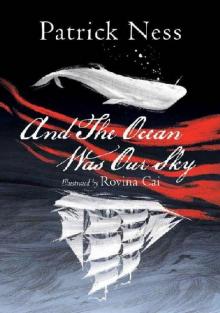 And The Ocean Was Our Sky
And The Ocean Was Our Sky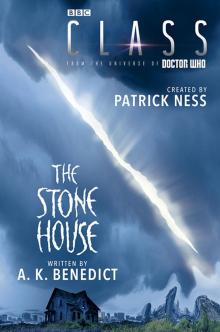 The Stone House
The Stone House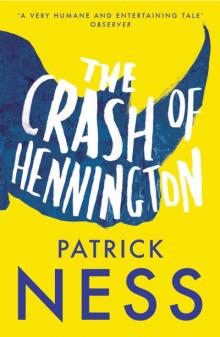 The Crash of Hennington
The Crash of Hennington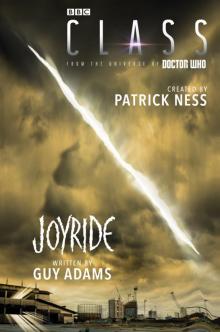 Joyride
Joyride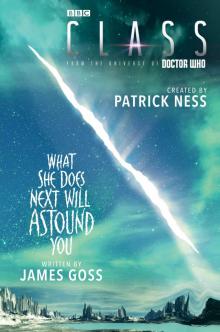 What She Does Next Will Astound You
What She Does Next Will Astound You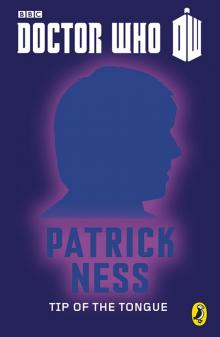 Tip Of The Tongue
Tip Of The Tongue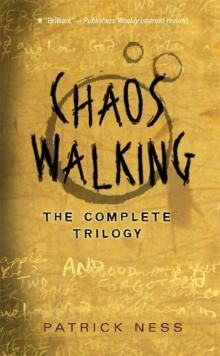 Chaos Walking
Chaos Walking